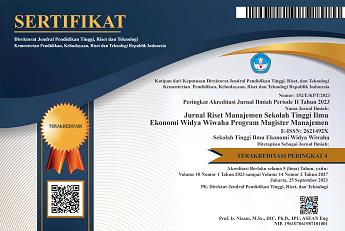MANAJEMEN CO-DETERMINATION BERBASIS GENDER DALAM SISTEM PERBURUHAN DI INDONESIA
DOI:
https://doi.org/10.32477/jrm.v2i2.89Keywords:
Gender, Co-Determination, LabourAbstract
This paper aims to determine the level of society’s satisfaction with the performance of public services in Rongkop Office District. Data is obtained by using a questionnaire. Questionnaire of Community Satisfaction Index (HPI) to the performance of services is based on the decision Men.PAN Number: KEP / 25M.PAN / 2/2004. Respondentsare 150 people. The result of research are: (1) Elements of serviceincluded in the excellent category A is the security environment. (2) The element of services that fall into category B are the terms of service, service personnel clarity, speed of service, courtesy and friendliness of the clerk, and comfortable environment. (3) The element of services that fall into the category of less good C are the sub-district service procedures, responsibilities of service personnel, the ability of service personnel, service personnel discipline, justice get service, the reasonableness of the cost of the service, the service cost certainty, and certainty of the service schedule. (4) Overall Community Satisfaction Index (HPI) on the performance of public serviceThis paper proposed the idea to remove gender discrimination experienced by women workers in the workplace as a result of deep-rooted cultural partiarkhi in Indonesia. This discrimination affects women workers to payrolls in different level of wages of men and women’s wages, for the same type of work. The idea is implemented by changing the system of human resource management in the gender-minded companies. This system will impose what is called the management co-determination that allows workers to express their aspirations through the mechanism of seats the labor commissioner in the commissioner seat so that workers can teralurkan aspirations. With this system, labor issues can be resolved effectively and efficiently because workers can take care of themselves through their representatives in the commissioner. Primarily women workers were often crushed by the burden of diakibatnya gender discrimination. Bottom-up policy system makes workers positioned as the subject of any measures taken for the workers themselves. Later management of co-determination and self-management will be a new system in Employment Act new.
References
Bernstein; Ron, David Binns, Marshal Hyman, Martin Staubus (2001). Designing an Employee Stock Option Plan: A Practical Approach for the Entrepreneurial Company, Foundation for Enterprise Development, La Jolla, California
Jupriono; D (1997) Betina, Wanita, Perempuan: Telaah Semantik Leksikal,Semant ik Historis, Pragmatik, FSU in the Limelight, Volume 5 No 1, Juli 1997
Kementrian Pemberdayaan Perempuan dan Perlindungan Anak dan Badan Pusat Statistik (2013) Pembangunan Manusia Berbasis Gender, November 2013
Laporan Bulanan Sosial Ekonomi Badan Pusat Statistik, Januari 2014
Luhulima, Achie Sudiarti (2007). Achie, Bahan Ajar Tentang Hak Perempuan : UU No. 7 Tahun 1984 Tentang Pengesahan Konvensi Mengenai Penghapusan Segala Bentuk Diskriminasi Terhadap Wanita, Yayasan Obor Indonesia, Jakarta
Marzuki, Peter Mahmudi (2010). Penelitian Hukum Normatif, Kencana, Jakarta
Miles, dan Huberman(1992). Analisa Data Kualitatif. UI Press. Jakarta
Moleong, Lexy J (2006). Metode Penelitian Kualitatif, Remaja Rosdakarya, Bandung
Nugroho, Riant (2008). Gender dan Administrasi Publik, Pustaka Pelajar, Yogyakarta
Paradis, Adrian A (2009). Buruh Beraksi ; Sejarah Gerakan Buruh Amerika Serikat, Kreasi Wacana, Yogyakarta
Rajaguguk HP (2012). Peran Serta Pekerja Dalam Pengelolaan Perusahaan (Co-Determination), Yayasan Obor Indonesia, Jakarta
Sevilla, Consuelo, G. (1993). Pengantar Metode Penelitian. Diterjemahkan oleh Alimuddin Tuwu.Universitas Indonesia Press.Jakarta
UUD 1945
Undang-Undang Nomor 39 Tahun 1999 tentang Hak Azazi Manusia
Undang-Undang Nomor 13 Tahun 2003 tentang Ketenagkerjaan
http://www.gajimu.com/main/gaji/kesenjanganupah
http://www.referenceforbusiness.com/management/ Or-Pr/Pioneers-of-Management.html
http://www.tribunnews.com/nasional/2013/04/21/ 75-buruh-perempuan-alami-kekerasanseksual









